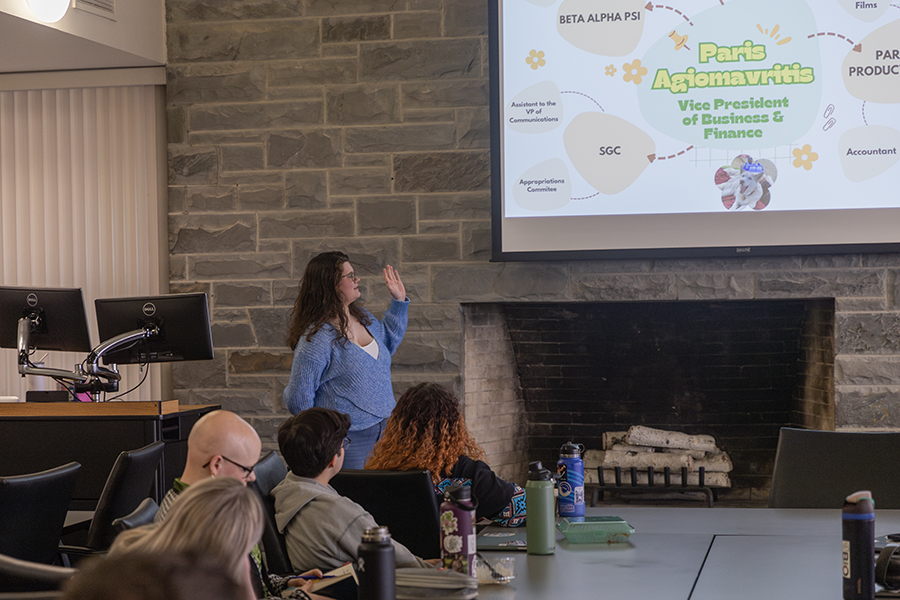Every morning in the village of Dryden, Bryan Roberts, the assistant dean for student services at the Roy H. Park School of Communications, is reminded of what he used to be able to do.

“I feel great,” Roberts said. “I can walk really well. That’s typically when I go for a run.”
He used to be able to run 10 miles a day. Now he runs three miles every three to four days through the streets of Dryden. After 30 minutes, though, his brain’s dopamine levels begin to drop.
“As the day goes on, I get a little worse,” Roberts said. “I have a right arm tremor. I’m starting to walk with a bit of a limp.”
Two years ago, Roberts took part in a charity basketball game in Purchase, N.Y. He was disappointed that he threw so many air balls and missed his free throws. He noticed some stiffness in his arm after the game.
“He came home thinking he was just getting older and hadn’t played basketball in a while,” his wife, Rebecca, said.
In May of that year, Roberts turned 30, and his arm still shook from time to time.
His wife recommended he see a doctor, thinking that it might have been a pinched nerve from working out too much.
“But the first neurologist I saw said I probably have a brain tumor,” Roberts said. “I was like, ‘My God.’”
Roberts didn’t tell his wife what the neurologist said because she was pregnant with their daughter, Avery, and he didn’t want to upset her until he was sure what was wrong.
“I went for more tests and MRIs and things like that, so they ruled out a brain tumor,” Roberts said. “Then they thought it would be Huntington’s disease.”
After further testing, however, doctors ruled out Huntington’s, which would have left Roberts with 15 to 20 years to live. By October 2010, Roberts’ neurologists gave him his real diagnosis.
“You have Parkinson’s disease,” Roberts’ doctor, Miodrag Velickovic, told him.
People with young-onset Parkinson’s include patients under the age of 50, according to the National Parkinson’s Foundation. Many suffer from sustained abnormal postures, tremors, depression and stiffness, but typically do not show all symptoms.
The rate of progression of these effects is much slower in patients with young-onset Parkinson’s. However, symptoms in people with this type of Parkinson’s will reach the same level of progression as those of older patients by the time they reach the same age.
Roberts said at first he was annoyed he had what he called an “old man’s disease,” and worried that his clock was ticking faster because of it.
“You think of old people who have it and then die,” Roberts said. “So that’s what I thought would happen to me initially.”
After doing research with his wife, Roberts said the disease became easier to manage when it became clear that though he developed Parkinson’s, he was not going to die.
“It was pretty upsetting because I didn’t know that much about it,” Rebecca Roberts said. “It’s one of those things where unless you know someone who has it, then you don’t really understand it. The more research we did, the more reassuring it was that this was something unfortunate, but not deadly.”
The disease has not hindered Roberts’ job as assistant dean at the college, where he helps guide students day to day in academics and graduation requirements.
Now that Avery is born, Roberts said he is going to start raising awareness of Parkinson’s disease. Roberts is advocating for the Michael J. Fox Foundation’s Trial Finder, which pairs researchers who are doing clinical trials with trial subjects.
“It’s almost like using social media to push the ball forward in terms of research and treatment,” Roberts said. “If you’re going to develop good treatments, good drugs, you need to have good clinical trials.”
Sophomore Blake Crist worked with Roberts in peer advising and said he noticed some of Roberts’ symptoms because he has a couple of family members with the disease. Crist said Parkinson’s has not affected Roberts’ work and Roberts still helps students with any problem or question.
“It’s not something that would ever affect your work or how you interact with people,” Crist said. “It’s more of a physical thing and not a mental thing.”
He said before he developed Parkinson’s he was not as sensitive to others’ problems, and even described it as “selfishness.” He said discovering he had Parkinson’s helped change that.
“Now I’m more sensitive to the fact that everyone has a challenge,” he said. “This is my challenge, and it’s something I can manage.”
Roberts said this new perspective is the bright side of his disease.
“It’s helped me be a better administrator, be a better husband, and hopefully will help me be a better father,” he said.







